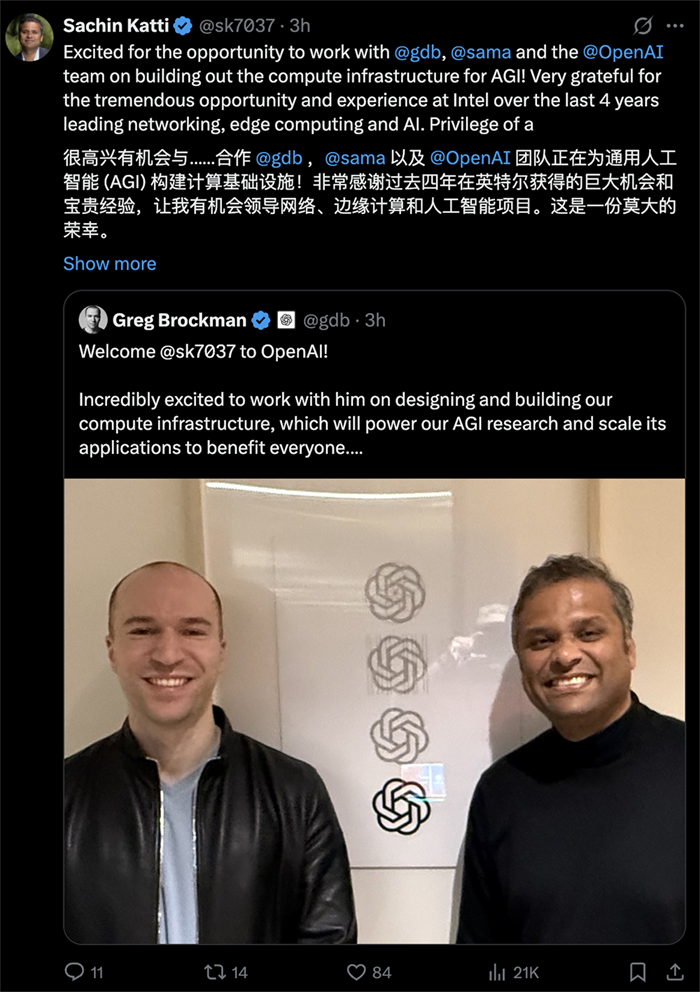On November 11, Intel announced that Sachin Katti, the company's Senior Vice President, Chief Technology Officer (CTO), Chief AI Officer, and General Manager of the Network and Edge Group, has resigned to join OpenAI. Katti will focus on building the compute infrastructure that will support OpenAI's artificial general intelligence (AGI) research.
In a post on social media platform X, Katti said, "Very grateful for the tremendous opportunity and experience at Intel over the last four years leading networking, edge computing and AI. Excited to join OpenAI to help design and build compute infrastructure that will power AGI and scale its applications to benefit everyone."
OpenAI President and co-founder Greg Brockman also wrote on X, "Incredibly excited to work with him on designing and building our compute infrastructure, which will power our AGI research and scale its applications to benefit everyone."
An Intel spokesperson confirmed Katti's departure and stated that CEO Lip-Bu Tan will personally lead Intel's AI and Advanced Technologies Groups to ensure continuity and focus. "AI remains one of Intel's highest strategic priorities," the company said. "We are focused on executing our technology and product roadmap across emerging AI workloads. We thank Sachin for his contributions and wish him all the best."
Katti joined Intel in November 2021 and led the Network and Edge Group since early 2023. In April 2025, shortly after Tan took over as CEO, Katti was promoted to CTO and Chief AI Officer, becoming responsible for Intel's overall AI strategy, AI product roadmap, Intel Labs, and its collaboration with startups and developer ecosystems.

Before joining Intel, Katti was a professor of electrical engineering and computer science at Stanford University, where he conducted pioneering research in wireless communications and networking. He earned his Ph.D. in electrical engineering and computer science from the Massachusetts Institute of Technology (MIT) and previously co-founded two technology startups — Kumu Networks, known for its self-interference cancellation technology, and Uhana, an AI-driven mobile network optimization firm acquired by VMware.
Katti's departure comes amid a major leadership reshuffle at Intel, as Tan continues to restructure the company to strengthen its competitiveness in AI and advanced manufacturing. Since August 2024, several senior executives have left the company, including former Xeon Processor General Manager Lisa Spelman, Xeon Chief Architect Sailesh Kottapalli (now at Qualcomm), Data Center and AI Group head Justin Hotard, Chief Strategy Officer Safroadu Yeboah-Amankwah, and longtime Intel executive Michelle Johnston Holthaus.

At the same time, Tan has been aggressively recruiting external talent to rebuild Intel's AI and data center leadership. Recent hires include former Arm executive Kevork Kechichian as Executive Vice President and General Manager of the Data Center Group, former Apple SoC engineer Jean-Didier Allegrucci as Vice President of AI SoC Engineering, and former Google engineer Shailendra Desai as Vice President of AI Network Architecture.
Intel has also made key internal promotions, such as appointing longtime executive Jim Johnson as Senior Vice President and General Manager of the Client Computing Group, and former Cadence executive Srini Iyengar as Senior Vice President and head of the new Central Engineering Division, tasked with driving Intel's custom chip business.
Meanwhile, Intel's China operations are also undergoing reorganization. Chief Revenue Officer Greg Ernst announced structural adjustments aimed at better aligning China-based engineering teams with global operations while maintaining strong local leadership. Sam Gao will now serve as General Manager of Intel China's Software, Client Computing Group (CCG) Customer Engineering, and CCG Business Division, reporting directly to Lisa Pearce, Intel's Vice President and head of Software Engineering. Additionally, Chen Baoli, General Manager of Intel China's Data Center Group, will report to Intel China Chairman Wang Zhichong.
These leadership transitions come as Intel seeks to regain momentum in the AI race. After missing its USD 500 million revenue goal for Gaudi AI chips last year, the company has redefined its data center AI strategy. At the 2025 OCP Global Summit held in October, Intel unveiled a 160 GB energy-efficient data center GPU codenamed Crescent Island, part of a new annual GPU release cadence designed to strengthen its open system and software architecture strategy for AI workloads.
Intel reported a net profit of USD 4.1 billion in the third quarter of 2025 — its first quarterly profit since 2024 — marking a significant financial rebound. With CEO Lip-Bu Tan now directly overseeing AI development and a refreshed executive lineup in place, Intel's leadership team is betting on artificial intelligence to drive the company's next phase of transformation and global growth.
+86 191 9627 2716
+86 181 7379 0595
8:30 a.m. to 5:30 p.m., Monday to Friday
